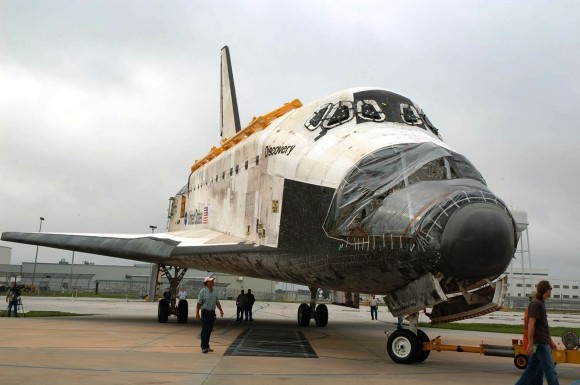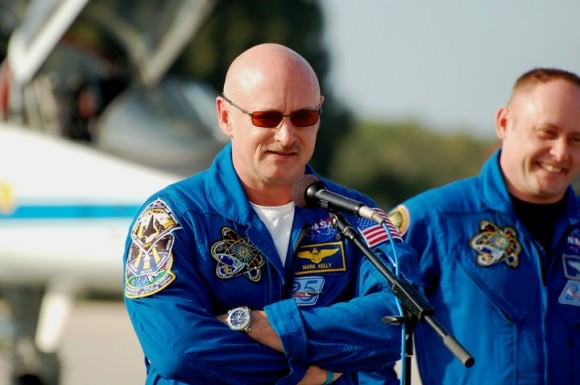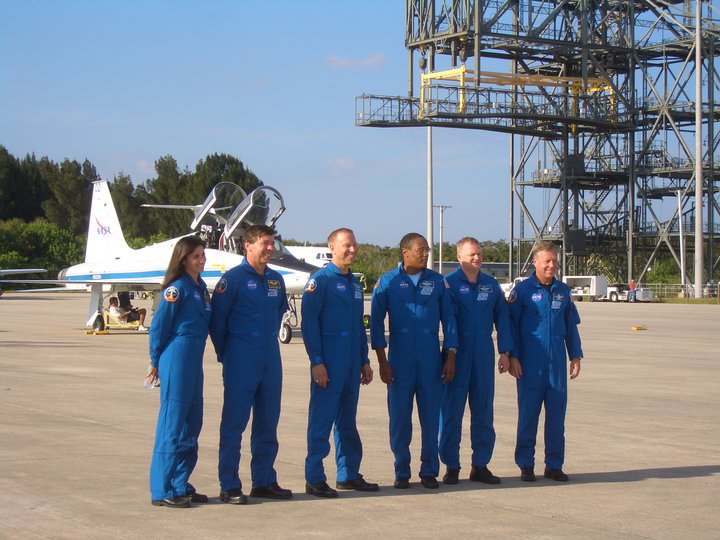[/caption]This past December the White House directed the National Academies to review how many astronauts that NASA actually needed to conduct its operations in the post-shuttle era. New findings in a new report are showing that rather than the space agency having too many astronauts – it will have too few to meet mission objectives. The National Research Council (NRC) has released a report showing that NASA is entering into a period where low numbers of qualified astronauts will affect the agency’s ability to conduct human space flight operations.
NASA once had a strong, stable astronaut corps but the agency has slowly but surely saw those numbers dwindle. In 1999 NASA had 150 astronauts today it has 61 – with more leaving the space agency every month. NASA needs to have a stable corps of space flyers for not only International Space Station operations but also to help develop the Orion Multi-Person Crew Vehicle (MPCV).

Moreover NASA needs its astronaut corps to remain stable so as to maintain its agreements with the Russian Federal Space Agency, European Space Agency, Japanese Aerospace Exploration Agency and Canadian Space agency. Fewer astronauts weakens NASA’s ability to fulfill operations that are required under these arrangements.
NASA is losing astronauts at approximately the rate of one every two months. If this exodus is allowed to continue the agency’s ability to conduct normal operations will be dramatically impaired. The NRC report highlights many of the nuances that space flight requires – most of which are missed when one considers space flight. Ground operations, emergency response, training and other elements that are involved with crewed space flight operations.

For many astronauts however the appeal of working for the space agency is fading. NASA no longer has clear-cut objectives as it once did. In 2004 plans were announced for NASA to go to the Moon, Mars and then other points in the solar system after the shuttle was retired. In 2010 NASA had the so-called ‘Vision for Space Exploration’ cancelled and the space agency was directed to assist commercial entities in developing technology to reach low-Earth-orbit. It is hoped that once these firms become viable NASA will be freed to fly to an asteroid and then Mars sometime in the 2030s.
NASA is experiencing what some might call a “brain drain” not only are astronauts departing the agency in large numbers – so too are other NASA officials. In recent months NASA’s Chief Technologist Bobby Braun, Safety Chief Bryan O’Connor and the Associate Administrator for Exploration Douglas Cooke (who has been with NASA for 38 years) have either left NASA or signaled their intent to do so.


Where do I submit my application?
SpaceX of Course
The private sector could EASILY finance a Mars Mission this decade… if only they join forces. ALL government ‘Space’ Agencies around the world operate inefficiently. We should boldly go…. 😉
Absolutely Easily SpaceX already has plans for Mars in the next 10 to 20 years. Ya know I post this a lot and get the beat down that goes like this “No Way” Really what about the fact that in “8 years” A man with a Dream built A Desert Spaceport the most powerful rocket man has built, well to be tested in a year, orbited a Dragon and brought her home safe and if a man was there would have had a fine ride, contracted to the ISS 12 flights with cargo and naut’s for less than the cost of One Shuttle flight. I really am really bothered by these Nay Sayer’s they see the facts and look away and tell me if NASA can’t no one can. Yup NASA has the knowledge but They “SpaceX” are partnered, and we know how to Manage money especially cause it’s our own not the tax payer’s
Most of the astronauts NASA had and has are dead weight but no one will ever say that publicly since they are so esteemed. The more important figure that hasnt been mentioned is the number of engineers and scientists that are leaving. It is they who really make the agency work. The astronauts get all the glory for their work.
I have mixed feelings on this. NASA is at an impasse in regards to human space flight. We can ride on the shoulders of other countries with these rides becoming fewer and farther between. But what good is an astronaut if s/he can’t go to space? It’s kinda in the job description. We are looking at a situation where a person sees their worth in doing their job. If NASA isn’t sending people to space, what good is it being an astronaut? Go to where the jobs ARE – SpaceX, Virgin Galactic…
I have mixed feelings on this. NASA is at an impasse in regards to human space flight. We can ride on the shoulders of other countries with these rides becoming fewer and farther between. But what good is an astronaut if s/he can’t go to space? It’s kinda in the job description. We are looking at a situation where a person sees their worth in doing their job. If NASA isn’t sending people to space, what good is it being an astronaut? Go to where the jobs ARE – SpaceX, Virgin Galactic…
The man in the loop is largely dead weight. Even with combat aircraft the future trend is already with robotic and drone aircraft. A robotic combat plane could in principle pull a 25-gee turn. A human being subjected to this would have to be washed out of the cockpit with a hose.
We know well enough how to get a spacecraft to anywhere in the solar system. I think we could in a few decades send probes to other stars. Sending humans become problematic. The size and complexity of things grows enormously. Astronauts requires living space and provisions. There are also the health issues with radiation and weightlessness. Then at the end of it all you are spending a lot of money to send humans somewhere, when with a much smaller investment robotic technology can be made to do the same thing.
LC
Indeed. In this day and age of increasingly sophisticated robotic technology, the only purpose of having a human being in the cockpit of a combat aircraft, or spacecraft, is hero worship.
I may have said this before but I wonder if this is the beginning of the end of usefulness of humans. Technology and AI are going to outpace the need for humans in space.
I may have said this before but I wonder if this is the beginning of the end of usefulness of humans. Technology and AI are going to outpace the need for humans in space.
There is one thing which computers and robots do not have; that is consciousness. So far AI has given no reason to suppose any of our “logic machines” have this intrinsic property of self-awareness. Even if there was a model of consciousness developed and then implemented technologically we would be faced with a “Pinocchio problem.” The Spielberg move “AI” posed this problem. Probably for some time robots and computers that we devise will be the epitome of unconsciousness. The human mind will be at least for some time into the future the thing which gives space data context.
LC
Computer consciousness is probably only 20-30 years away, or 50 at most. Not long at all historically. So I’ll stand by my point that I think we may be at the beginning of the end of human intellectual dominance. And the shift to non-biological tech in space is a signpost for the future.
I think what will come first is the neural-cyber link. Instead of human brains being replaced by cybernetic systems, I could see the human brain becoming a node on the internet. The micro-devices which have exploded around us of late, iPhones, iPads etc, suggest that the input-output link between the human brain and computers is already growing rapidly. In ten years I suspect we will have eye-ware that acts as screens, which then progresses to laser retinal raster scanning of input data and then eventually direct neural interfacing.
From there it is then possible that over time the bio-ware will become less relevant and there might emerge some self-sustaining, maybe conscious, global cyberlink. Where things go from there is impossible to say. There is also the other growing development where we can design up organisms. I would not be surprised if in a few decades there are bio-kits which permit anyone with reasonable skill to design organisms to their wishes. This could of course include designing up some ghastly disease organism.
Of course everything is easy to predict except the future. The one thing which does seem almost inescapable is that the human sphere is going to become enormously more complex in the coming decades. Of course the flip side is that we might get some sociopathic President who decides to dial up the second coming of Jesus with the nuclear launch codes. There are also troublesome issues of resource peaks and coming draw-downs on available energy and materials. That could lead to massive political and international upheavals, or even nuclear war. Then in the end we face the really big problem of running out of environment, where in effect we collapse our bio-support system on Earth.
If we had relativistic space travel one could venture into the next century by accelerating out and then back. What you might find could be astounding or disappointing.
LC
The neural-cyber link feels very plausible to me, and in the very near future. Things are gonna get weird on planet Earth.
The man in the capsule would not care if there were dangers even knowing the risk of death is real. Hero yes, to us who can’t or wont go. But do not diminish the desire to do the adventure to be the first, to give all to learn, to give all for our future. The mother earth, Gaia, has given up her plans to many times to rocks or gasses. we need to As the enlightened Prof said “To Boldly Go” If Big Gov can’t do it then private enterprise will, Stay the Hell out of our way or get rocket rash.
This is great news to me since I’ve always wanted to be either a fireman or an astronaught.